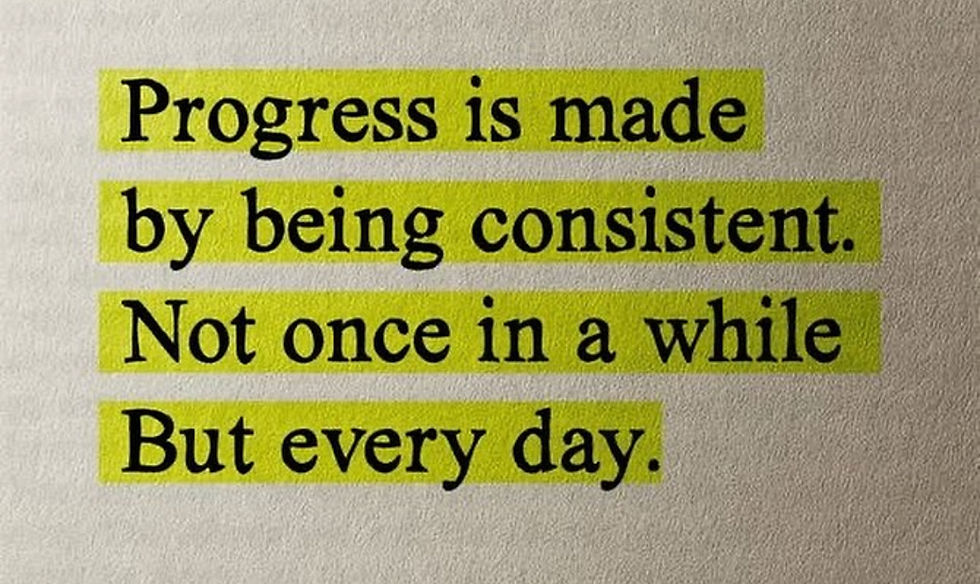How to Be More Consistent with Exercise and Nutrition
- Jill Washecka
- Aug 1
- 3 min read

Without Overhauling Your Life
We all want to be consistent...if you don't, stop reading. See you next week.
But let’s be honest: life is full, time is short, and energy isn’t unlimited. These are the EXACT times you need the routine.
Because when motivation dips or schedules shift (hello, back-to-school chaos, surprise meetings, or just general exhaustion), the routines we meant to follow fall apart.
So how do you actually stay consistent without relying on willpower alone? Willpower does not work. Willpower is like a battery. It runs out quickly under stress, fatigue, or decision overload, which is why relying on it alone rarely leads to lasting change.
The answer isn’t doing more. It’s doing less, but more often.
Why Consistency Matters More Than Intensity
We tend to think success comes from going all in—strict plans, long workouts, food rules. But research tells a different story.
A 2020 study published in the journal Obesity found that people who had more consistent eating habits, even without being perfect, were more successful at long-term weight management than those who were more erratic, even when their calorie intake was similar.
The same goes for exercise. A study in the American Journal of Lifestyle Medicine showed that frequency and routine matter more for building habits than the duration or intensity of individual workouts.
“It's not the perfect plan that changes you—it’s the consistent one you can stick with.”
Why Big Goals Often Backfire
I’ve worked with so many women who come in ready to transform everything overnight: 5-day workout splits, zero sugar, daily food tracking, gallon of water, 10k steps, foam rolling, journaling…
You can guess what happens. They last a few days. Maybe a week.
Then life hits. The routine becomes too heavy. They miss a workout, grab fast food one night, forget to track. And because they set the bar so high, missing one thing feels like failure. And failure feels like a reason to stop.
A friend of mine recently chose to do the 75 Hard instead of my more balanced 60 Medium—and let’s just say it turned into the 12-Day Hard. Setting more realistic expectations is what set me up for success.
The Power of Small Wins
Let’s flip the script. Instead of trying to do everything, focus on doing one small thing—and doing it often. That’s where momentum comes from.
Imagine one of my clients who has not worked out in years.
Instead of a five-day plan, we start with:
One 20-minute strength workout
Two walks per week
A high-protein breakfast every morning
That’s it.
Within two weeks, they feel better. They have proof that they can show up. From there, we add a second strength day. Then some meal prep. Then hydration habits. Slowly, purposefully and meaningful.
This process builds confidence—and confidence builds consistency.
Real-Life Example: My Client Lisa
Lisa (name changed) was a full-time working mom in perimenopause. She felt sluggish, overwhelmed, and frustrated by the scale.
We started with just three things:
Walk 10 minutes every morning
Add protein to lunch
Lift weights 2x a week (less than 30 minutes each)
She didn’t count calories. She didn’t overhaul her diet.
In four weeks, she reported more energy, better sleep, and a major drop in cravings. By week six, she added a third workout, and by week eight, she said, “This feels like me again.”
The Neuroscience of Habit Stacking
According to BJ Fogg, author of Tiny Habits, the easiest way to stay consistent is to anchor a new behavior to something you already do.
Real life examples:
As my coffee is brewing, I will take my medicine and drink 4-6 oz of water.
After I brush my teeth, I’ll take my magnesium supplement.
After dinner, I’ll prep my chia seed pudding breakfast for tomorrow.
These aren’t flashy. But they work—because they lower the friction.
What This Looks Like for You
If you’re trying to be more consistent, ask yourself:
What’s the smallest possible step I can take today?
What’s one thing I could do more often, not perfectly?
Where can I anchor a new habit into my existing routine?
You don’t need to meal prep a week’s worth of food. Just prep your breakfast.
You don’t need a full hour at the gym. Just do 15 minutes of movement in your living room.
You don’t need to cut out sugar. Just eat enough protein to stabilize your energy.
Final Takeaway
Consistency isn’t about being perfect. It’s about creating rhythms that fit into real life, even when things are busy, messy, or unpredictable.
And once those rhythms feel automatic? That’s when you add more.
If you’re ready to stop starting over and finally build a routine that sticks, I can help you get there. Whether you need a simple plan, accountability, or just someone to remind you that progress isn’t all or nothing—I’m here.



Comentarios